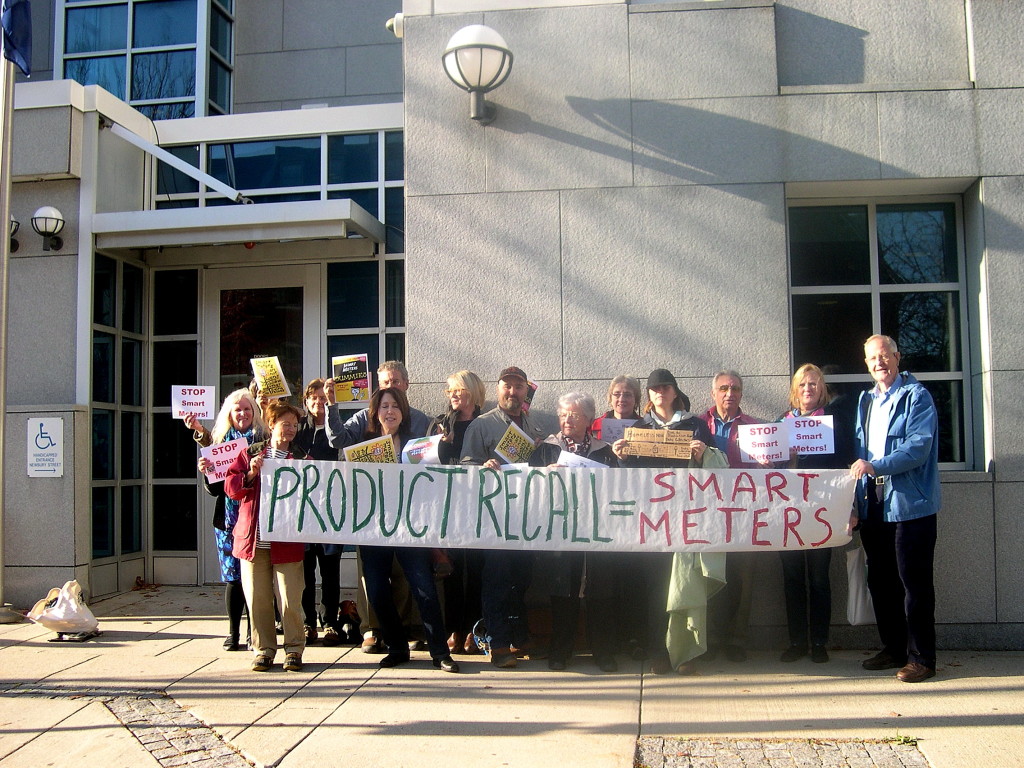As part of a potentially precedent-setting court case before the Maine Supreme Judicial Court over the health and safety of smart meters, on November 3rd justices heard an appeal of a previous ruling that smart meters were essentially “safe enough.”
Attorney Bruce McGlauflin represented lead plaintiff Ed Friedman of Maine Coalition to Stop Smart Meters in the Maine Supreme Court, and presented evidence from physicians, microbiologists, and other professionals that radiation emitted by smart meters poses a serious risk of physical harm, and should be recalled.
Video of the oral arguments from both sides in the legal dispute is embedded above. The justices grill the attorney for the state utility commission, and confront him with evidence in the record that “there is persuasive evidence of a possible risk.”
According to Ed Friedman, it will probably will be a few months before a decision is rendered but it could come at any time. Stay tuned to Maine’s website for the latest breaking news. Thank you to the people of Maine for keeping the pressure on utilities to be accountable for their smart grid/ smart meter debacle!
Important Links:
Please contribute to the Maine Coalition’s legal effort through their website.










Regardless of the FCC regulations,right or wrong,the many complaints of adverse health effects from the public,MUST BE CONSIDERED !!There are many SCIENTIFIC studies that confirm the fact that E M F is a HEALTH HAZARD>
on top of that, there are no cost benefits to the consumer. That alone should allow consumers to opt out.
I am impressed with the questioning of these judges. It is about time the system that has been designed to protect the public is being called to task!
What malarky about smart meters offering enhanced service! At what cost besides health, sanity and privacy? Meters that cost more, and half a life span of 1/5th the time??These stupid meters are costing every person a fortune – WHO is really benefitting??
America and American beauacracies are behind the times.
Australia has banned smartphones and devices in public.
Wireless is behind the times. America is behind the times of best health
and practices and policies of promoting longetivity, freedom, preservation,
and renewal.
Getting out of the systems of destruction is a trend.
The bigger picture is that American infrastructure is of destructiveness. Outside of that is Non-compliance, de-centralization from globalization and centralized forms
of governance where local and public governance takes precedence for the first time
in 500 year history (the Fifth World in which humanity is emerging into now, while exiting from the fourth world of destruction,
control, domination, status quo, desecration, the profane, the patriachy ….) …
and takes charge of LIFE again. A process.
https://www.youtube.com/watch?v=9YlNzYO92r0
Dr. Ron Paul: The libertarian (limited, de-centralized government).
Your body is your property, including the air you breathe, …..
Including the airwaves and electropollution that affect the dna and cellular health of our property, our
bodies.
http://www.huffingtonpost.com.au/2016/01/14/phone-ban-workplace_n_8975828.html?utm_hp_ref=australia
___
http://money.cnn.com/2015/05/18/technology/smartphones-schools-ban/index.html
FINALLY!! more to come nationwide and worldwide!!
___
IoD calls for Smart Meters scheme to be ‘halted, altered or scrapped’ to avoid ‘unjustified, over-engineered and expensive mistake’
The Government’s rollout of Smart Meters, digital energy meters designed to provide real-time usage statistics, should be “halted, altered or scrapped” to avoid a potentially catastrophic government IT disaster, the Institute of Directors warns today.
In a major new report entitled “Not too clever: will Smart Meters be the next Government IT disaster?” the IoD brands the £11bn scheme, the largest government IT project in history, “unwanted by consumers, devoid of credibility and mind-blowingly expensive”. The business group calls on an incoming government to review the project and “consider a fresh start”.
The Smart Meter programme, which has the hugely ambitious target of installing 100 million new pieces of kit in homes and business by 2020, was initiated by Ed Miliband as energy secretary in 2008, following an EU Directive, and confirmed by the Coalition Agreement in 2010. The report’s author, Dan Lewis, Senior Infrastructure Advisor at the IoD, calls the political consensus “a conspiracy of silence among politicians in thrall to big ideas and even bigger budgets”.
Lewis continues:
“The professed aims of the Smart Meter programme are laudable, and we all recognise the benefits of reducing consumption and increasing energy awareness. But there is little credible evidence to suggest that a scheme of this size and complexity will achieve those goals.”
The IoD report highlights a number of key concerns:
Despite the EU Directive, 11 nations have ruled out electricity smart meters and only 5 are pushing ahead with the 2020 target for gas meters. In contrast, as is so often is the case, the UK has gold-plated the Directive.
The government refuses to publish any of the reports on the programme by the Major Projects Authority.
The cost-benefit analysis conducted by the Department for Energy and Climate Change is so heavily redacted as to be almost unreadable.
The Smart Meter network would be vulnerable to cyber-attack and disruption.
Introducing time-of-day pricing to shift consumer demand will only work with price increases that are not politically realistic. Retail consumers really can’t change their energy consumption that much.
The report places the rollout of Smart Meters within the context of previous large-scale IT fiascos, including the infamous NHS National Programme for IT, the eBorders Programme and the BBC’s disastrous Digital Media Initiative. Furthermore, a recent survey shows that 80 per cent of IoD members rate the ability of government to manage large IT projects as “poor or very poor”.
Dan Lewis adds:
“This scheme is far from smart. The dishonourable roll call of government IT projects that have haemorrhaged vast amounts of taxpayers’ money to no discernible effect needs no further additions. Consumers will not forgive the already unpopular energy companies for a costly programme which fails to deliver and ends up making them poorer. Without a change of direction, whoever wins the general election is at risk of overseeing a spectacular failure in the next parliament. They would be well-advised to consider a fresh start.
“Consumers do not want the meters, they have proved a costly mistake in countries where they have been rolled out, and the Government is withholding key details about their costs and benefits. This makes for a programme which is devoid of credibility, over-engineered and mind-blowingly expensive. Perhaps the only reason why the cost and ambition of this project has not become a national scandal already is because of a conspiracy of silence among politicians in thrall to big ideas and even bigger budgets.”
A key area of concern outlined in the report is that the technology behind the scheme is untested and some parts will likely be obsolete by the scheduled switch-on date of 2020. The new wireless standard, ZigBee, which is being developed for Smart Meters is complex and expensive compared to the better-known Wi-Fi or Bluetooth. Each property will also get an in home display, but there is scant evidence of consumer demand. British Gas found that only 60% of customers looked at their displays even once a month a year after installation.
Recommendations
An incoming government should consider the following changes:
Stop the smart gas meter deployment – only a handful of EU nations are planning to deploy gas smart meters by 2020. This would save billions of pounds.
Remove the requirement for an in home display – expected to cost £800m in total, the displays will be out of date in a few years. Far better to connect smart meters to people’s phones, tablets and PCs
Limit the rollout to homes with high energy usage – those who use more than 5,100 kWh of electricity, and 23,000 kWh of gas a year have much more to gain. This would reduce the scale of the rollout by 80%.
Abandon attempts to stretch the rollout to tower blocks – the most technically challenging aspect of the project with the lowest potential returns. This would remove seven million homes from the scheme.
Make the programme genuinely voluntary – offered to customers at their own expense, not subsidised by all.
Abandon the whole programme and develop a smart phone app instead – look into developing a smart app which would convert a photo of their current mechanical meter into a meaningful number for the suppliers. This would cost tens of thousands of pounds rather than billions.
Lewis added:
“We know that an incoming government will be under intense financial pressure, having to find further cuts to public spending. This does not fit well with increasing energy bills for a project that has such unrealistic targets, such large costs and such uncertain benefits.”
Read the full report here.
ENDS
Contacts for further comments or to arrange interviews:
Christian May
Head of Communications and Campaigns
Institute of Directors, 116 Pall Mall, London SW1Y 5ED
020 7451 3263
07908 358 728
Christian.May@iod.com
Edwin Morgan
Head of Media Relations
Institute of Directors, 116 Pall Mall, London SW1Y 5ED
020 7451 3392
07814 386 243
Edwin.Morgan@iod.com
Looks like we have to start waking up again, individually and planetary wise.
“smartgrids”, “smart meters”, “smartphones” and “smart technology”, the corruptions …
it’s time to take a stand and say no.
take back your own power,
Nature or technology?
Life or death?
I choose Life.
___
Biometric Banking: Iris Scanners Coming to ATMs, Developed by Company Accused of Election Fraud
Published: January 31, 2016
Share | Print This
La Verdad Boutique Cigars – LaVerdadCigars.com
By Kevin Samson
Regular readers will be aware of our ongoing chronicle covering the increasing use of biometrics in a range of security measures from standard police use, to travel, to banking.
The video below makes the same plea to embrace new technology that is always heard when discussing a solution to the very real threat of identity theft. However, it is worth noting that in this case the company which is developing the solution is Diebold. This is the company that has been charged with hacking democracy during an investigation into bribery, fraud, and a “worldwide pattern of criminal conduct.”
Diebold’s latest solution involves registering transactions with your smartphone, then having your iris scanned at the ATM. Major banks such as Citigroup have begun testing.
Feeling safer?